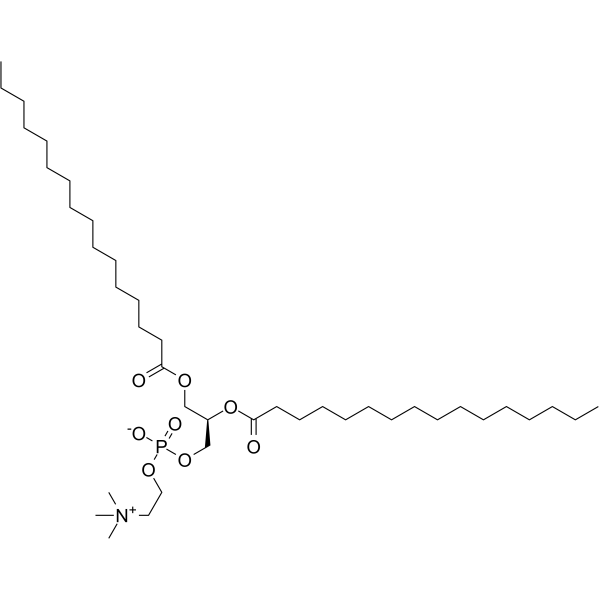All AbMole products are for research use only, cannot be used for human consumption.

DPPC (129Y83) is a zwitterionic phosphoglyceride that can be used for the preparation of liposomal monolayers. DPPC-liposome serves effectively as a delivery vehicle for inducing immune responses against GSL antigen in mice.
| Molecular Weight | 734.04 |
| CAS Number | 63-89-8 |
| Solubility (25°C) | Ethanol 25 mg/mL |
| Storage | -20°C, dry, sealed |
[1] Yu V Zaytseva, et al. Conformational state diagram of DOPC/DPPC d62/cholesterol mixtures
| Related Cell Transfection Products |
|---|
| HBpep(RPY)-SP acetate
HBpep(RPY)-SP acetate is a variant of the polypeptide HBpep-SP. HBpep(RPY)-SP acetate interacts with lipid bilayers and has demonstrated exceptional transfection efficiency in challenging-to-transfect cells, such as primary and immune cells. HBpep(RPY)-SP acetate is useful for research in protein, gene, and immune cell therapies. |
| Chitosan (≥95% deacetylated, MW 50000-60000)
Chitosan (≥95% deacetylated, MW 50000-60000) is a polycationic linear polysaccharide derived from chitin .Chitosan is non-toxic, hypoallergenic, biocompatible, biodegradable, and possesses anti-tumor, anti-bacterial, anti-fungal, and antioxidant activities.Chitosan can be used in studies related to drug delivery and cell transfection. |
| DOTAP methylsulfate
DOTAP methylsulfate is a cationic derivative of trimethylammonium attached to two 18-carbon fatty acid tails, each with a single alkene group. 18:1 TAP is a cationic liposome-forming compound useful for the transfection of DNA, RNA, and other negatively charged molecules into eukaryotic cells. |
| Chitosan (MW 150000)
Chitosan (MW 150000) is a polycationic linear polysaccharide derived from chitin with a molecular weight of 150000.Chitosan is non-toxic, hypoallergenic, biocompatible, biodegradable, and possesses anti-tumor, anti-bacterial, anti-fungal, and anti-oxidant activities.Chitosan can be used in studies related to drug delivery and cell transfection. |
| Chitosan (MW 30000)
Chitosan (MW 30000) is a polycationic linear polysaccharide derived from chitin with a molecular weight of 30,000.Chitosan is non-toxic, hypoallergenic, biocompatible, biodegradable, and possesses anti-tumor, anti-bacterial, anti-fungal, and antioxidant activities.Chitosan can be used in studies related to drug delivery and cell transfection. |
All AbMole products are for research use only, cannot be used for human consumption or veterinary use. We do not provide products or services to individuals. Please comply with the intended use and do not use AbMole products for any other purpose.


Products are for research use only. Not for human use. We do not sell to patients.
© Copyright 2010-2024 AbMole BioScience. All Rights Reserved.
